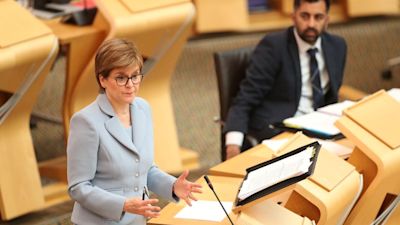Covid lockdown easing in Scotland likely to be delayed from original June 28 date, says Nicola Sturgeon

Scotland is "unlikely" to follow through with original plans to further ease its coronavirus restrictions on June 28, First Minister Nicola Sturgeon has announced.
Rather than move to Level 0 from that date, the country is "likely" to maintain Covid rules for three more weeks.
Sturgeon's announcement comes after UK Prime Minister Boris Johnson confirmed most Covid-19 restrictions in England's will remain in place for another four weeks, delaying the planned June 21 unlocking until July 19.
Level 0, or baseline, restrictions allow larger groups to meet indoors, adult contact sport can return, pubs and other hospitality venues can shut under their local licensing laws, rather than abiding to a national curfew, and the maximum attendance at weddings and funerals will be 200.
Currently most of Scotland is split between Level 2, where people can drink alcohol indoors, meet in homes in groups of no more than six from a maximum of three households and can also travel from outside their local authority area to other parts of the country, and Level 1 which allows up to eight people from three households to meet inside public spaces while, outdoors, the limit has increased to 12 people from 12 households.
It also means 100 people – rather than 50 – can attend weddings and funerals.
Ms Sturgeon acknowledged the announcement would be "difficult and frustrating" for everyone but explained the Scottish government needed to "buy ourselves sufficient time" to allow the vaccination programme to continue its work.
She said: “Given the current situation – and the need to get more people fully vaccinated before we ease up further – it is reasonable to indicate now that I think it unlikely that any part of the country will move down a level from June 28.
“Instead, it is likely that we will opt to maintain restrictions for a further three weeks from June 28 and use that time to vaccinate – with both doses – as many more people as possible.
“Doing that will give us the best chance, later in July, of getting back on track and restoring the much greater normality that we all crave.”
The first minister said there was still hope the country can return to a "greater degree of normality" over the summer.
Ms Sturgeon told MSPs on Tuesday a paper will be published next week and the government will lay out how restrictions will look after Level 0 in the lockdown easing route map.
She said: “This is important because, while we have had to pause the route map, we do still hope that vaccination will allow us, over the summer, to move beyond Level 0 and back to a much greater degree of normality.”
The final report of a review of physical distancing will also be published, the first minister said.
Ms Sturgeon said: “I know the current situation is difficult and frustrating for everyone.
“We all want to see the back of all restrictions as soon as possible.
“However, while this setback is not easy, it is worth remembering that we are living under far fewer restrictions now than was the case a few weeks ago.
Coronavirus: What you need to know - Why scientists demanded the June 21 Freedom Day delay
“The current situation is not what any of us want – but equally it is not lockdown. And vaccination is – with every day that passes – helping us change the game.”
Scotland has recorded two Covid deaths and 974 new infections in the past 24 hours. The daily test positivity rate is 5%, down from 5.2% the previous day.
A total of 137 Covid patients were in hospital on Monday, an increase from 128 on Sunday. 17 of those patients are in intensive care.
At least 3,531,461 people have received the first dose of a Covid jab and 2,470,18 have received their second dose. The Scottish government noted IT issues at Public Health Scotland on Tuesday mean vaccination figures may be an underestimate.
Covid vaccine tracker: How many people have been vaccinated in the UK?
UK records 7,742 new cases of coronavirus and three further deaths as lockdown delay looms
The first minister said the highest number of new admissions was in those in their 30s and 40s.
Speaking in Holyrood, Ms Sturgeon said: “The fact that more of the recent hospital admissions are in younger age groups may mean that fewer of the people being admitted are becoming seriously ill or requiring intensive care. It made also help to explain my next point.
“Hospital occupancy – the total number of people with Covid in hospital at any given time – is not rising at the same rate as hospital admissions or cases.
“Indeed, while there has been an approximate five-fold increase in cases since the start of May, hospital occupancy is around double what it was at the start of May.
“That suggests that people are being discharged more quickly and spending, on average, less time in hospital than patients in earlier phases of the pandemic. Again, though, while that is encouraging, further analysis is needed to confirm this.”
The Scottish government is planning for booster Covid vaccines in the autumn.
Nicola Sturgeon told MSPs on Tuesday that guidance was expected in the coming weeks from the Joint Committee on Vaccinations and Immunisations (JCVI) on the issue.
The first minister also said moves are being made to vaccinate 12 to 17-year-olds, in case the JCVI recommend it.